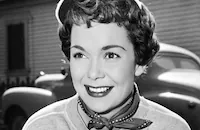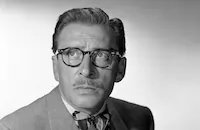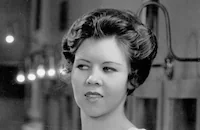Let's Do It Again

Brief Synopsis
Cast & Crew
Alexander Hall
Jane Wyman
Ray Milland
Aldo Ray
Leon Ames
Valerie Bettis
Film Details
Technical Specs

Synopsis
Broadway composer Gary Stuart discovers to his outrage that while he was taking a brief holiday from his marriage to former star Constance Stuart, she spent an evening in a country inn with rival composer Courtney Craig. Connie points out the impropriety of Gary's own behavior with dancer Lilly Adair, yet when he agrees with her suggestion to consult a lawyer, she is regretful. Over the next few weeks, Connie broods and Gary spends most of his time alone, then their divorce decree is issued with a sixty-day waiting period. In a ploy to visit Connie, Gary asks if he might stop by to use his special piano, which, with the flip of a switch, plays every chord in the key of C. Connie grudgingly agrees, but Gary storms out when she receives flowers from Courtney, who also asks her to replace an out-of-town actress in an audition the next day. Connie agrees and her performance wins the enthusiastic backing of young Alaskan pitchblende mining millionaire Frank McGraw. Frank has been a longtime admirer of Connie and begins courting her in earnest. Connie eventually agrees to see Frank, and one evening after a date they return to Connie's apartment to find Gary and some movers trying to get the piano out through the side windows, which are too small. When Connie, for expedience, agrees to have the windows taken out to allow the move, Gary, who is immediately jealous of Frank, bribes the movers to drag out the process as long as possible. A few weeks later, Courtney visits Connie to protest her just-announced engagement to Frank when it is clear she still loves Gary. Connie insists her divorce will go through as planned. Meanwhile, Gary, still believing that Connie is dating Courtney, complains bitterly to his brother Chet, who reveals that actually she has been seeing Frank. When Gary runs into Connie and Frank a few nights later at a supper-club where Lilly is performing, he arranges an introduction between Lilly and Frank. Very early the next morning, Connie awakens to the sound of music, as Gary has been composing on the piano all night. When Connie objects, he plays his latest tune for her. Although captivated by the song, Connie insists she is committed to marrying Frank as soon as the divorce decree becomes final. Resigned, Gary agrees to depart after cleaning up. While Connie prepares breakfast, Frank appears and discovers Gary roguishly attired in Connie's robe. Frank has learned about Connie and Courtney and demands an explanation. Gary implies that Connie's interest in Courtney was the only cause for their divorce, then departs, to Connie's annoyance. Later, Gary's new show opens out of town to acclaim, but as Chet observes, Gary does not care because of Connie's absence. When Gary insists that Connie cheated on him with Courtney, Chet proves that the story of the country inn was a fabrication meant to make Gary jealous. Meanwhile, in the city, Connie is packing for a trip to Seattle to meet Frank's parents when Courtney arrives, determined to intervene. He proposes to Connie, who is stunned but then breaks down and admits she still loves Gary. Just then Gary, delighted his suspicions about Courtney were untrue, arrives and Connie pleads with Courtney to hide. Gary's enthusiasm is interrupted when Frank arrives to take Connie to the airport, and Gary darts into the bedroom where Courtney is hiding. When the two tumble out fighting moments later, Frank is affronted and leaves, and soon Connie hears that he is seeing Lilly. From then on Gary refuses to speak to or see Connie and begins dating socialite Deborah Randolph. Connie grows more frantic as the sixty-day waiting period nears its end and finally gets Gary to agree to meet at the apartment on the pretext of approving the piano moving plan. When Gary ignores all Connie's romantic overtures and telephones Deborah in front of her, Connie retaliates by singing a romantic song loudly at the piano. Gary covers with Deborah by claiming his sister is singing. When he returns to his apartment later, Deborah has arranged a large party at Gary's "sister's" request. Connie, pretending to be Gary's sister, arrives in a stylish dress and imitates one of Lilly's dance routines for the guests, but Deborah recognizes her and tells Gary he should return to Connie. Stirred by Connie's dance routine, Gary realizes he has been foolish to look at other women, and back at their apartment with only moments to go before the divorce decree goes into effect, Gary questions Connie about her fidelity to him. When she admits she has always been faithful, they embrace and resume their marriage.

Director

Alexander Hall
Cast

Jane Wyman

Ray Milland

Aldo Ray

Leon Ames

Valerie Bettis

Tom Helmore
Karin Booth

Mary Treen
Richard Wessel

Kathryn Givney
Herbert Heyes
Maurice Stein
Frank Remley
Don Rice
Don Gibson
Bob Hopkins
Vesey O'davoren
Anthony De Mario
Alphonse Martell
David Mcmahon
Herb Vigran
William Newell
Joey Ray
Douglas Evans
Walter Clinton
Robert Williams
Steve Pendleton
Howard Negley
Jack Gargan
Joe Fay
Frank Connor
Major Sam Harris
Leoda Richards
Crew
Earl Bellamy
Valerie Bettis
Clay Campbell
George Cooper
Francis Cugat
George Duning
Walter Holscher
Helen Hunt
Fred Karger
William Kiernan
Charles Lawton Jr.
Lester Lee
Mary Loos
Jean Louis
Charles Nelson
Richard Sale
Oscar Saul
Lee Scott
Donald W. Starling
Morris Stoloff
Ned Washington

Film Details
Technical Specs

Articles
Let's Do It Again -
By Glenn Erickson

Let's Do It Again -
Quotes
Trivia
Notes
Working titles of the film were Love Song, Anyone But You and Great While It Lasted. The Hollywood Reporter review incorrectly referred to the film as a remake of the 1940 Columbia production Too Many Husbands. Of the several film adaptations made of Alan Richman's play, all under the title The Awful Truth, the first was a silent film by Peninsula Studios in 1925, directed by Paul Powell and starring Agnes Ayers and Warner Baxter. In 1929 Pathé remade the film as a talkie, directed by Marshal Neilan and starring Ina Claire, who headed the 1922 Broadway cast (see AFI Catalog of Feature Films; 1921-30). The most familiar version was filmed in 1938 by RKO Studios, directed by Leo McCarey and starring Cary Grant and Irene Dunne (see AFI Catalog of Feature Films; 1931-40).

Miscellaneous Notes
Released in United States Summer June 1953
Shown at Cannes International Film Festival (Retrospective) May 9-20, 2001.
Shown at Toronto International Film Festival (Talking With Pictures) September 9-18, 1999.
Remake of "The Awful Truth" (1937).
Released in United States Summer June 1953













